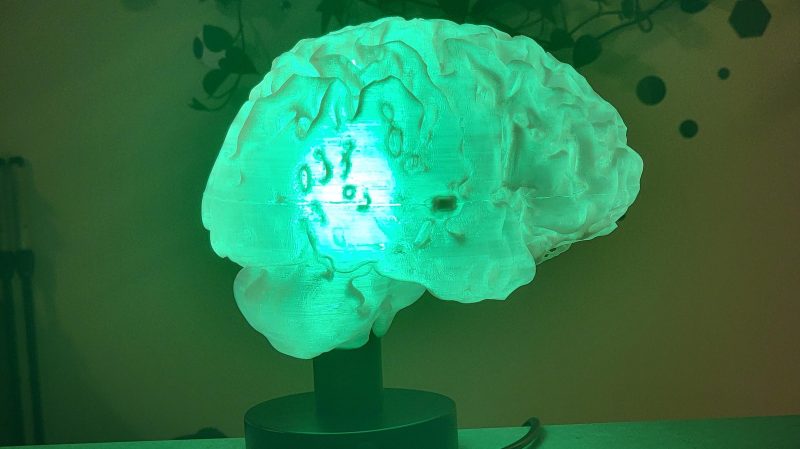MRIs generally fall somewhere on the scale from boring to stressful depending on why you’re having one and how claustrophobic you get. Regardless, they’re a wonderful diagnostic tool and they’ve saved thousands if not millions of lives over the years. In a fun use of the technology, [mandalaFractals] has shown us how to make a 3D-printed brain lamp using an MRI scan of the head.
The build starts with an off-the-shelf lamp base and a smart LED bulb as the light source, though you could swap those out as desired for something like a microcontroller, a USB power supply, and addressable LEDs if you were so inclined. The software package Slicer is then used to take an MRI brain scan and turn it into something that you can actually 3D print. It’ll take some cleaning up to remove artifacts and hollow it out, but it’s straightforward enough to get a decent brain model out of the data. Alternatively, you can use someone else’s if you don’t have your own scan. Then, all you have to do is print it in a couple of halves, and pop it on the lamp base, and you’re done!
It’s a pretty neat build. Who wouldn’t love telling their friends that their new brain lamp was an accurate representation of their own grey noodles, after all? It could be a fun gift next time Halloween rolls around, too!
Meanwhile, if you’ve got your own MRI hacks that you’ve been cooking up, don’t hesitate to let us know!
















Of course the downside to a project like this is that you need to have some negative-to-your-health medical reason to have a brain scan MRI in the first place (no-one is going to go get a scan just so they can build a lamp out of it…)
You must be new around here.
haha
Yep. Definitely new around here. There are a few hombre MRI projects posted to hackster.io and plenty of people like myself that have access to MRI equipment.
If you live in a city with a university and/or research hospital, it’s probable you can get a brain scan and get paid for it. Just volunteer for an imaging study, accept just the brain imaging ones, and ask for a copy of the scan data. Pro tip: don’t accept any study that involves any kind of injection.
That is basically what I did. My friend was doing a PhD in medical imaging and needed volunteers. The research hospital had just fitted a brand new top of the line MRI so it did very high resolution scans. I’ve got a set of fMRI scans as well but they’re very blocky. The radiographer asked before if I wanted to know if they found anything bad. I told them to tell me as I figured better to know sooner than later but thankfully it was clear.
Well if you’re going to build it for Halloween you have to put it in a jar.
Now how do I schedule that MRI
If you could actually get such data, sure…
My doctor offered me a copy of the CT scan of my ankle.
smooth brain…
only a few wrinkles and bumps, all ideas slide right off like a waterfall